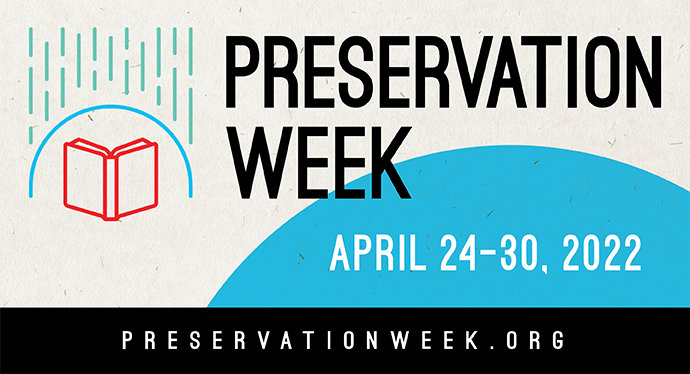
Preservation Week, April 24 – 30, 2022, promotes the role of cultural institutions in preserving personal and public collections and treasures. This year, the theme of Preservation Week is “Preservation in the Face of Climate Change,” which highlights the effects climate change has on our shared cultural heritage and celebrates the concept of climate resiliency.
With this in mind, we wanted to take a moment to remember that climate change disproportionately impacts socially vulnerable populations. In November, American Libraries Association President Patricia M. Wong recognized in her article “Solidarity on Sustainability” that the core values of libraries include a commitment to social responsibility, sustainability, and equity. She states that libraries “have important roles to play in preparing our communities for the impact of climate change, and we must pledge to center sustainability in our operational practices.” Some examples of this work can be seen in a February 2022 ALA Connect Live conversation titled “Sustainability and Climate Action for Libraries and Our Communities,” of which you can watch the recording. This discussion also generated further links and resources, including using a DEI scorecard, for considering the importance of disaster and emergency preparedness planning, as well as a sustainable commitment to equity, diversity, inclusion, and justice — all key parts of effective preservation.
Another broad resource that might help you get a sense of the current conversations around the overlapping cultural heritage fields is The Future of Our Pasts: Engaging Cultural Heritage in Climate Action, prepared by the Climate Change and Heritage Working Group of ICOMOS (International Council on Monuments and Sites) and published in 2019. Page 19 introduces some of the ideas around climate justice, which is defined as, “Justice that links development and human rights to achieve a human-centered approach to addressing climate change, safeguarding the rights of the most vulnerable people and sharing the burdens and benefits of climate change and its impacts equitably and fairly.” The full report explores how “cultural heritage is both impacted by climate change and [is] a source of resilience for communities,” by assessing how cultural heritage concerns intersect with the objectives of the Paris Agreement.
A unique digital project that focuses on the histories and “stories of communities working towards environmental justice” was developed in 2021 by Paul Quinn College and the advocacy group Downwinders At Risk. The tool, called “Dallas Environmental Injustice Archive,” collects, maps, and archives the stories of community members who are fighting for environmental justice, while increasing their visibility and informing ongoing advocacy work. It is important to share the successes and challenges of this work, as a member of Downwinders At Risk noted the need for improved “corporate and state accountability for the injustices seen in our city, [which are concentrated] in Black, brown and low-income neighborhoods.”
Lastly, a useful activity from the collective project Archivists Against History Repeating Itself is the Archives and Climate Justice Teach-in Module, created by Ted Lee as a part of various Archives and Climate Change Teach Ins in 2019. Included in the module is a link to a Climate Change Syllabus, with many resources to support further efforts and learning about how archives and heritage fields can engage in climate justice. The teaching module includes learning objectives and materials to use for hosting facilitated discussions and encouraging unstructured learning - and the goals of this specific teach-in include “mak[ing] explicit connections between archival theory and practice and the current conditions that allow climate change to continue unmitigated.”
We encourage you to consider how climate change is intertwined with social justice, and the ways that your collecting organization can enact change. Please let us know through email at info@DHPSNY.org, or connect with us on the DHPSNY Facebook page or DHPSNY Community Facebook Group. Also, save the dates, November 14 and 15, 2022, for CCAHA’s two-day virtual conference #OurCollectionsOurPlanet, an event that will explore the intersection of historical, cultural, and environmental conservation (details to come on the CCAHA Events page).
This post is part of a biweekly blog series on sharing information, promoting resources, encouraging discussion, and amplifying the voices of Black, Indigenous, and People of Color (BIPOC) doing antiracism work in archives, museums, history sites, and library special collections. DHPSNY is committed to supporting the diverse network of collecting institutions that safeguard and ensure access to historical records and library research materials across New York State. To learn more, visit our first blog post in the series.
To access the full list of resources in this series, visit our Antiracism Resources links spreadsheet.